高中英语外研版必修一Module2 My New Teachers- grammar课件(共39张ppt)
文档属性
| 名称 | 高中英语外研版必修一Module2 My New Teachers- grammar课件(共39张ppt) | 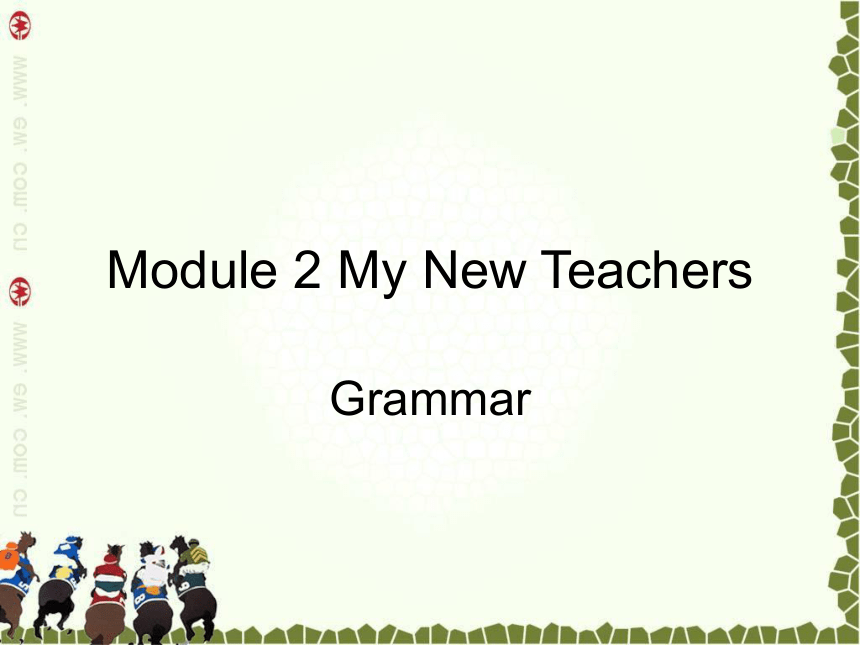 | |
| 格式 | zip | ||
| 文件大小 | 849.5KB | ||
| 资源类型 | 教案 | ||
| 版本资源 | 外研版 | ||
| 科目 | 英语 | ||
| 更新时间 | 2021-05-11 15:16:04 | ||
图片预览

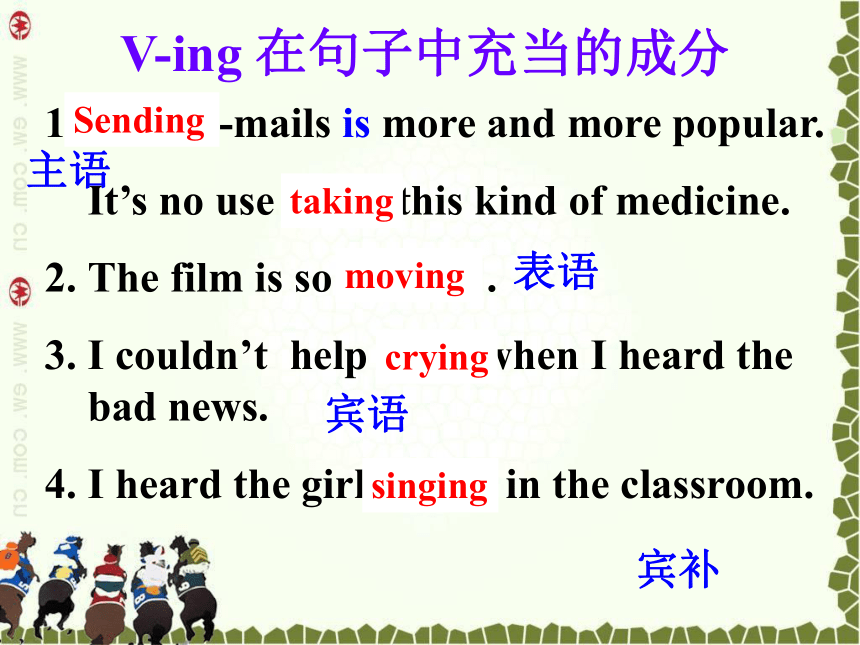



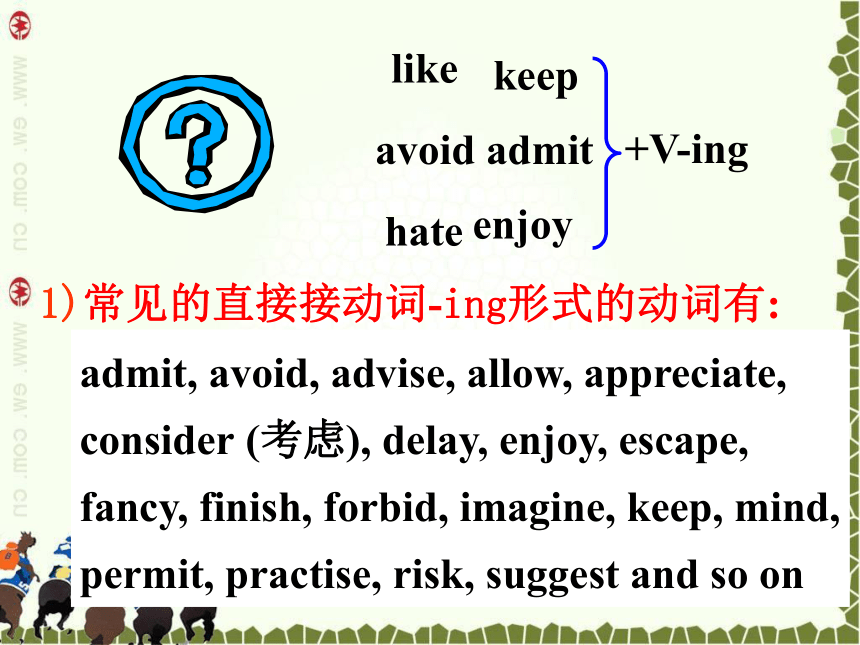


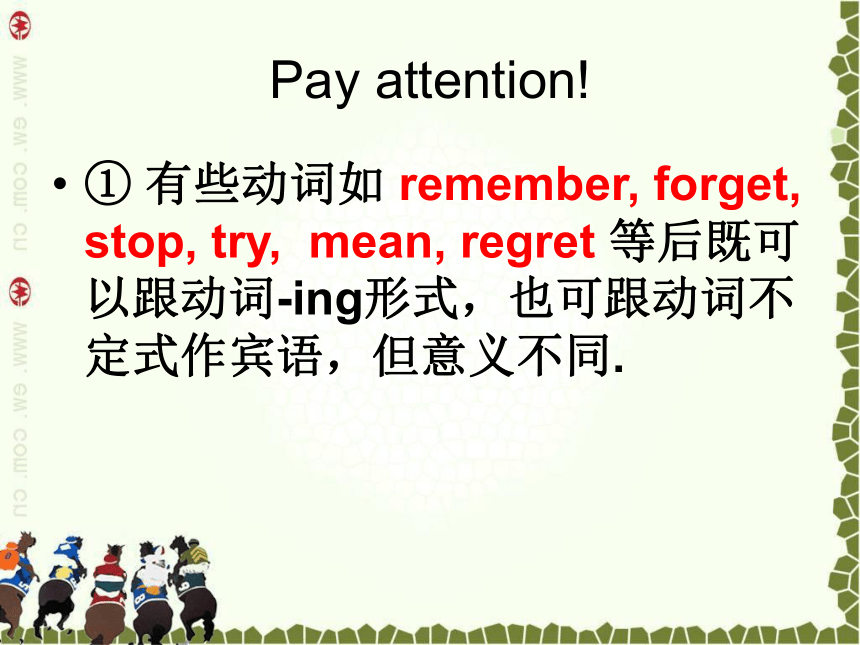
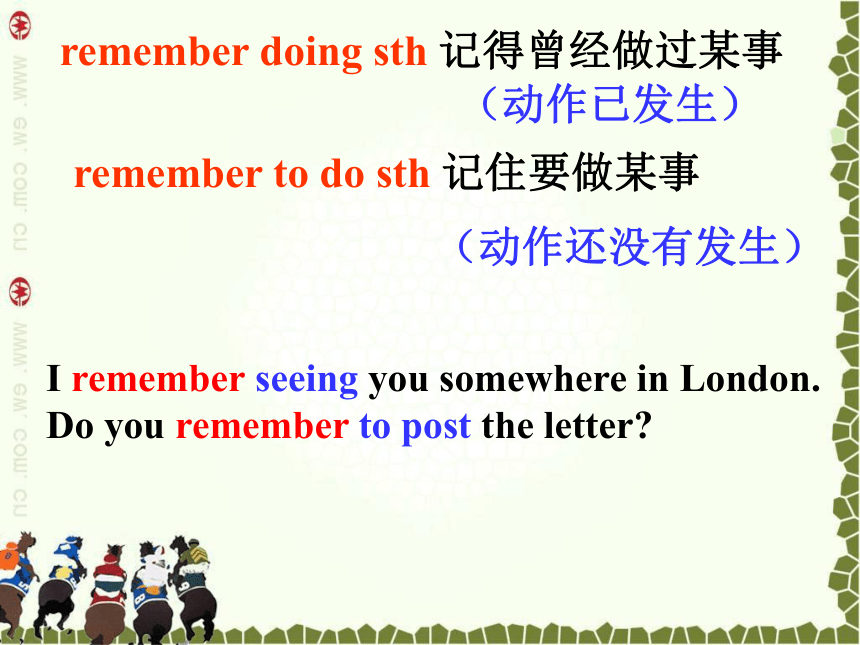
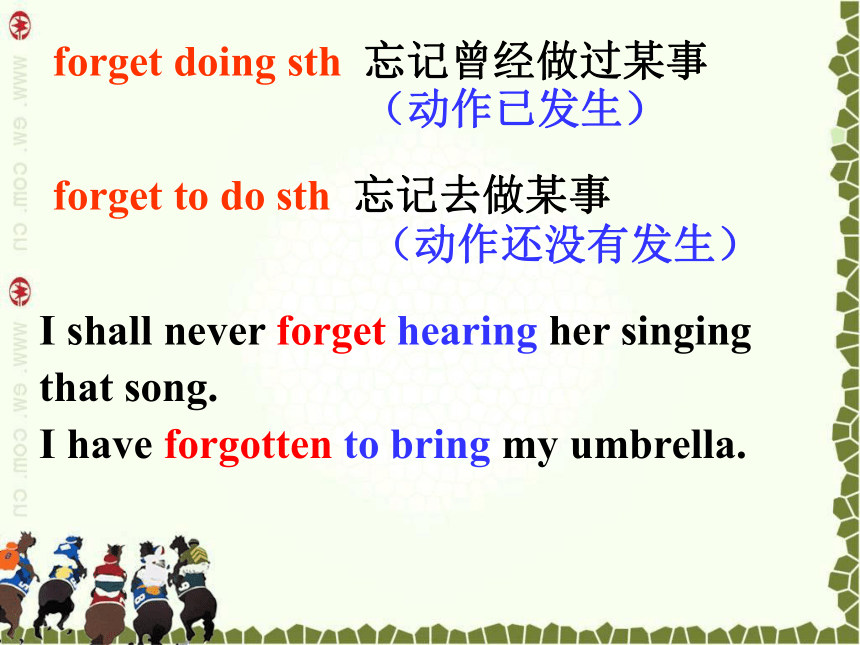
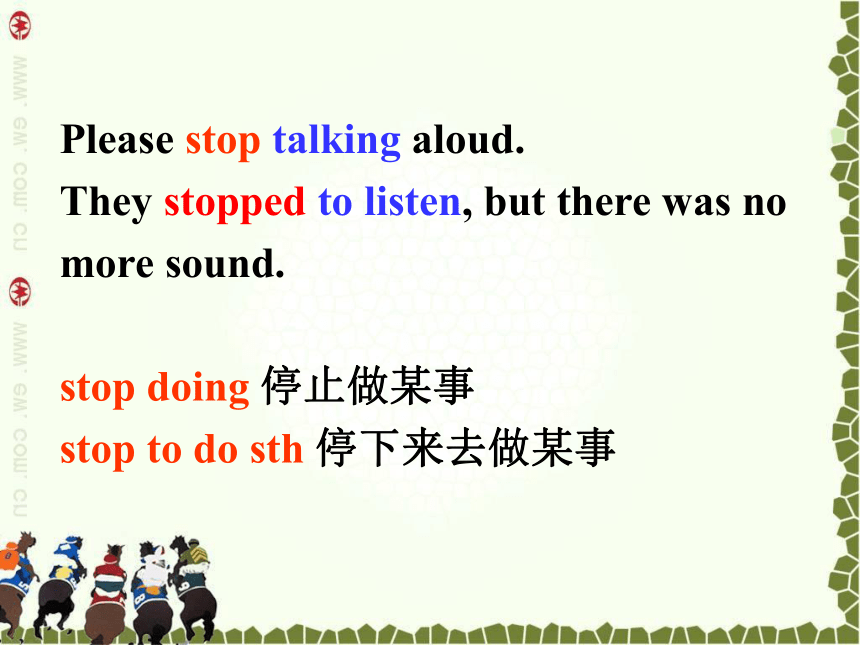
文档简介
(共39张PPT)
Module
2
My
New
Teachers
Grammar
V-ing
在句子中充当的成分
Send
e-mails
is
more
and
more
popular.
It’s
no
use
take
this
kind
of
medicine.
The
film
is
so
moved
.
I
couldn’t
help
cry
when
I
heard
the
bad
news.
I
heard
the
girl
sung
in
the
classroom.
Sending
taking
moving
crying
singing
主语
表语
宾语
宾补
5.
China
is
a
develop
country.
6.
Hear
the
cry
for
help,
he
rushed
out.
定语
状语
developing
Hearing
1.
But
now,
after
two
weeks,
the
class
really
likes
working
with
her.
2.
She
avoids
making
you
feel
stupid.
3.
I’ve
always
hated
making
mistakes
or
pronouncing
a
word
incorrectly…
4.
There
are
a
few
students
who
keep
coming
to
class
late…
Verbs
followed
by
-ing
5.
And
a
few
students
even
admit
liking
her.
6.
I
think
this
is
because
he
really
enjoys
teaching
Chinese
literature.
Verbs
followed
by
-ing
like
hate
keep
enjoy
+V-ing
1)常见的直接接动词-ing形式的动词有:
admit,
avoid,
advise,
allow,
appreciate,
consider
(考虑),
delay,
enjoy,
escape,
fancy,
finish,
forbid,
imagine,
keep,
mind,
permit,
practise,
risk,
suggest
and
so
on
avoid
admit
2)常见的直接接动词-ing形式的短语:
feel
like,
give
up,
can’t
help,
be
used
to,
keep
on,
insist
on,
look
forward
to,
put
off,
devote…to
,
stick
to,
object
to,
get
close
to,
thanks
to,
be
busy
in,
get
down
to,
have
some
trouble
/difficulty
/problems
(in)
如:
Exercise
1—fill
in
the
blanks
I
really
enjoyed
_________(work)
on
the
farm.
She
had
finished
_________
(listen)
to
the
news.
I
am
looking
forward
to
________(see)
you.
The
doctor
advised
_________
(taking)
more
exercise.
The
boy
refused
to
admit
________(steal)
my
money.
working
listening
seeing
taking
stealing
Pay
attention!
①
有些动词如
remember,
forget,
stop,
try,
mean,
regret
等后既可以跟动词-ing形式,也可跟动词不定式作宾语,但意义不同.
remember
doing
sth
记得曾经做过某事
remember
to
do
sth
记住要做某事
(动作已发生)
(动作还没有发生)
I
remember
seeing
you
somewhere
in
London.
Do
you
remember
to
post
the
letter?
forget
doing
sth
忘记曾经做过某事
forget
to
do
sth
忘记去做某事
(动作已发生)
(动作还没有发生)
I
shall
never
forget
hearing
her
singing
that
song.
I
have
forgotten
to
bring
my
umbrella.
Please
stop
talking
aloud.
They
stopped
to
listen,
but
there
was
no
more
sound.
stop
doing
停止做某事
stop
to
do
sth
停下来去做某事
Why
not
try
doing
it
in
some
other
way?
I
tried
to
solve
the
problem
but
I
couldn’t.
try
doing
试着做某事
try
to
do
sth
尽力去做某事
“做做看”之意
“想要努力去做”之意,但实际上有没有做是另一回事。
Missing
the
bus
means
waiting
for
another
hour.
I
am
sorry
I
hurt
you,
but
I
never
meant
to.
mean
to
do
sth
打算做某事
mean
doing
意味着……
I
regret
lending
him
so
much
money.
He
never
paid
me
back.
I
regret
to
tell
you
that
you
failed
the
test.
regret
doing
对于……感到后悔
regret
to
do
sth
因……感到遗憾
I
like
listening
to
music
of
this
kind.
I
like
to
listen
to
this
song.
They
prefer
going
to
the
beach
in
summer.
They
prefer
to
be
alone
now.
表示一般情况
表示一般情况
表示特定情况
表示特定情况
②
动词like,
love,
prefer
后接不定式或动词-ing形式作宾语均可。但有一些细微的差别。如表示经常性、习惯性的动作常用动词-ing形式,如表示特定情况或具体动作则常用动词不定式。如:
I’d
like
to
go
swimming
this
weekend.
I
would
love
to
meet
your
parents.
注意:如果like,
love,
prefer前有would/should
时,后面则接动词不定式。
I
am
beginning
to
remember
it.
The
snow
began
to
melt.
He
began
to
feel
afraid.
It
started
to
rain.
③
begin,
start,
continue
后跟不定式和动词-ing形式,通常没有差别。但在下列三种情况下,其后需用动词不定式:
A.?当begin/start
用于进行时时;
B.?当begin/start的主语是物时;
C.?当其后的动词为不可以用于进行时的表示心理活动或精神状态的动词时。
The
house
wants/needs/requires
repairing.
The
house
wants/needs/requires
to
be
repaired.
④
need
表示“需要”,require表示
“要求”,want
表示“需要”时后面
接动词-ing形式或
to
be
done结构。
⑤
有时动词-ing形式前面可有自己的逻辑主语。如:
我打开门你介意吗?
Would
you
mind
my
opening
the
door?
你不介意我坐你旁边吧?
Would
you
mind
my
sitting
next
to
you?
2.
The
discovery
of
new
evidence
(证据)
led
to
_______.
A.
the
thief
having
caught
B.
catch
the
thief
C.
the
thief
being
caught
D.
the
thief
to
be
caught
1.
In
some
parts
of
London,
missing
a
bus
means________
for
another
hour.
A.
waiting
B.
to
wait
C.
wait
D.
to
be
waiting
Exercise
3.??One
learns
a
language
by
making
mistakes
and
______
them.
A.?correct
B.
correcting
C.
corrects
D.
to
correct
4.??She
meant
_____
but
the
look
on
your
face
suggested
“No”.
A.?explaining
B.
to
explain
C.
explanation
D.
to
be
explained
5.
—
When
did
you
go
to
the
States?
—
I
remember
_____
there
when
I
was
ten.
A.?
having
taken
B.
to
be
taken
C.
being
taken
D.
to
take
6.
He
is
so
busy
that
he
can’t
help
_____
the
classroom.
A.
cleaning
B.
to
cleaning
C.
to
clean
D.
cleaned
7.
—
I
have
been
knocking
at
the
door,
but
no
one
answers.
—
Why
not
____
at
the
back
door?
A.
try
knocking
B.
try
to
knock
C.?
to
try
knocking
D.
to
try
to
knock
8.
As
a
young
man
from
a
rich
family,
can
you
imagine
____
in
such
a
small
and
dirty
place?
A.
to
work
B.
yourself
to
work
C.
working
D.
work
9.
My
uncle
is
considering
______
his
heath.
A.
improve
B.
to
improve
C.
improving
D.
to
be
improved
10.
We
should
keep
________
English
every
day.
A.?
to
practise
speaking
B.
practise
speaking
C.
practising
speaking
D.
practising
to
speak
11.
He
got
well-prepared
for
the
job
interview,
for
he
couldn’t
risk
_______
the
good
opportunity.
A.
to
lose
B.
losing
C.
to
be
lost
D.
being
lost
12.
She
was
so
angry
that
she
felt
like
______
something
at
him.
A.
to
throw
B.
to
have
thrown
C.
throwing
D.
having
thrown
13.
Jean
did
not
have
time
to
go
to
the
concert
last
night
because
she
was
busy
______
for
her
examination.
A.
to
prepare
B.
to
be
prepared
C.
preparing
D.
being
prepared
14.
The
form
needs
______
in
ink.
A.
filling
in
B.
to
fill
in
C.
being
filled
in
D.
to
be
filled
15.
Does
your
shirt
require
______,
sir?
A.
being
pressed
B.
to
press
C.
to
be
pressed
D.
to
be
pressing
16.
That
you
gave
him
such
a
book
to
read
meant
_____.
A.
to
waste
his
time
B.
wasting
his
time
C.
being
wasted
his
time
D.
to
be
wasted
his
time
17.
Mr
Smith
had
meant
______
here
the
next
day,
but
he
changed
his
mind.
A.
leaving
B.
being
left
C.
having
left
D.
to
leave
18.
Smith
enjoys
______
football
on
Sunday
afternoon,
doesn’t
he?
A.
to
be
playing
B.
to
playing
C.
to
play
D.
playing
Exercise
3—fill
in
the
blanks
1.I
remembered
_________
(turn)
off
the
TV.
2.
Remember
___________
(come)
to
school
on
time.
3.
I
shall
never
forget
_________
(meet)
her
for
the
first
time.
4.
I
have
forgotten
__________
(make)
a
call
to
her.
5.
I
regret
_________
(tell)
him
the
secret.
He
is
a
person
who
gossips.
6.
I
regret
_________(tell)
you
that
you
failed
the
test.
turning
to
come
meeting
to
make
telling
to
tell
7.Please
stop
________
(talk)
loudly.
8.
They
stopped
__________(listen),
but
heard
nothing.
9.
Why
not
try_______
(do)
it
in
some
other
way?
10.
I
tried
_________
(solve)
the
problem
but
I
couldn’t.
talking
to
listen
doing
to
solve
父亲决定戒烟。
My
father
has
decided
to
give
up
smoking.
2.
我盼望着收到你的来信
I’m
looking
forward
to
hearing
from
you.
3.
他已经习惯于住在大城市.
He
has
got
used
to
living
in
big
cities.
Translation
4.
误了这班车意味着还得等一个小时。
Missing
the
bus
means
waiting
for
another
hour.
5.
在车祸中,Tom差点丧命.
(got
close
to)
Tom
got
close
to
being
killed
in
the
car
accident.
6.
她成功的通过了考试。
She
succeeded
in
passing
the
exam.
1.
As
a
new
driver,
I
have
to
practise
___
the
car
in
my
small
garage
again
and
again.
(2008上海春)
A.
parking
B.
to
park
C.
parked
D.
park
2.
--
They
are
quiet,
aren’t
they?
--
Yes.
They
are
accustomed
____
at
meals.
(2008江苏)
A.
to
talk
B.
to
not
talk
C.
to
talking
D.
to
not
talking
3.
Susan
wanted
to
be
independent
of
her
parents.
She
tried
____
alone,
but
she
didn’t
like
it
and
moved
back
home.
(2008湖南)
A.
living
B.
to
live
C.
to
be
living
D.
having
lived
4.
--
Robert
is
indeed
a
wise
man.
--
Oh,
yes.
How
often
I
have
regretted
____
his
advice!
(2007
安徽)
A.
to
take
B.
taking
C.
not
to
take
D.
not
taking
5.
--
Can
I
smoke
here?
--
Sorry.
We
don’t
allow
____
here.
(2007
江苏)
A.
people
smoking
B.
people
smoke
C.
to
smoke
D.
smoking
6.
All
the
staff
in
our
company
are
considering
____
to
the
city
centre
for
the
fashion
show.
(2007
上海春)
A.
to
go
B.
going
C.
to
have
gone
D.
having
gone
Homework
1.
Revise
the
–ing
form
2.
Finish
the
learning
plan
3.
Best
English
page
21—22
Module
2
My
New
Teachers
Grammar
V-ing
在句子中充当的成分
Send
e-mails
is
more
and
more
popular.
It’s
no
use
take
this
kind
of
medicine.
The
film
is
so
moved
.
I
couldn’t
help
cry
when
I
heard
the
bad
news.
I
heard
the
girl
sung
in
the
classroom.
Sending
taking
moving
crying
singing
主语
表语
宾语
宾补
5.
China
is
a
develop
country.
6.
Hear
the
cry
for
help,
he
rushed
out.
定语
状语
developing
Hearing
1.
But
now,
after
two
weeks,
the
class
really
likes
working
with
her.
2.
She
avoids
making
you
feel
stupid.
3.
I’ve
always
hated
making
mistakes
or
pronouncing
a
word
incorrectly…
4.
There
are
a
few
students
who
keep
coming
to
class
late…
Verbs
followed
by
-ing
5.
And
a
few
students
even
admit
liking
her.
6.
I
think
this
is
because
he
really
enjoys
teaching
Chinese
literature.
Verbs
followed
by
-ing
like
hate
keep
enjoy
+V-ing
1)常见的直接接动词-ing形式的动词有:
admit,
avoid,
advise,
allow,
appreciate,
consider
(考虑),
delay,
enjoy,
escape,
fancy,
finish,
forbid,
imagine,
keep,
mind,
permit,
practise,
risk,
suggest
and
so
on
avoid
admit
2)常见的直接接动词-ing形式的短语:
feel
like,
give
up,
can’t
help,
be
used
to,
keep
on,
insist
on,
look
forward
to,
put
off,
devote…to
,
stick
to,
object
to,
get
close
to,
thanks
to,
be
busy
in,
get
down
to,
have
some
trouble
/difficulty
/problems
(in)
如:
Exercise
1—fill
in
the
blanks
I
really
enjoyed
_________(work)
on
the
farm.
She
had
finished
_________
(listen)
to
the
news.
I
am
looking
forward
to
________(see)
you.
The
doctor
advised
_________
(taking)
more
exercise.
The
boy
refused
to
admit
________(steal)
my
money.
working
listening
seeing
taking
stealing
Pay
attention!
①
有些动词如
remember,
forget,
stop,
try,
mean,
regret
等后既可以跟动词-ing形式,也可跟动词不定式作宾语,但意义不同.
remember
doing
sth
记得曾经做过某事
remember
to
do
sth
记住要做某事
(动作已发生)
(动作还没有发生)
I
remember
seeing
you
somewhere
in
London.
Do
you
remember
to
post
the
letter?
forget
doing
sth
忘记曾经做过某事
forget
to
do
sth
忘记去做某事
(动作已发生)
(动作还没有发生)
I
shall
never
forget
hearing
her
singing
that
song.
I
have
forgotten
to
bring
my
umbrella.
Please
stop
talking
aloud.
They
stopped
to
listen,
but
there
was
no
more
sound.
stop
doing
停止做某事
stop
to
do
sth
停下来去做某事
Why
not
try
doing
it
in
some
other
way?
I
tried
to
solve
the
problem
but
I
couldn’t.
try
doing
试着做某事
try
to
do
sth
尽力去做某事
“做做看”之意
“想要努力去做”之意,但实际上有没有做是另一回事。
Missing
the
bus
means
waiting
for
another
hour.
I
am
sorry
I
hurt
you,
but
I
never
meant
to.
mean
to
do
sth
打算做某事
mean
doing
意味着……
I
regret
lending
him
so
much
money.
He
never
paid
me
back.
I
regret
to
tell
you
that
you
failed
the
test.
regret
doing
对于……感到后悔
regret
to
do
sth
因……感到遗憾
I
like
listening
to
music
of
this
kind.
I
like
to
listen
to
this
song.
They
prefer
going
to
the
beach
in
summer.
They
prefer
to
be
alone
now.
表示一般情况
表示一般情况
表示特定情况
表示特定情况
②
动词like,
love,
prefer
后接不定式或动词-ing形式作宾语均可。但有一些细微的差别。如表示经常性、习惯性的动作常用动词-ing形式,如表示特定情况或具体动作则常用动词不定式。如:
I’d
like
to
go
swimming
this
weekend.
I
would
love
to
meet
your
parents.
注意:如果like,
love,
prefer前有would/should
时,后面则接动词不定式。
I
am
beginning
to
remember
it.
The
snow
began
to
melt.
He
began
to
feel
afraid.
It
started
to
rain.
③
begin,
start,
continue
后跟不定式和动词-ing形式,通常没有差别。但在下列三种情况下,其后需用动词不定式:
A.?当begin/start
用于进行时时;
B.?当begin/start的主语是物时;
C.?当其后的动词为不可以用于进行时的表示心理活动或精神状态的动词时。
The
house
wants/needs/requires
repairing.
The
house
wants/needs/requires
to
be
repaired.
④
need
表示“需要”,require表示
“要求”,want
表示“需要”时后面
接动词-ing形式或
to
be
done结构。
⑤
有时动词-ing形式前面可有自己的逻辑主语。如:
我打开门你介意吗?
Would
you
mind
my
opening
the
door?
你不介意我坐你旁边吧?
Would
you
mind
my
sitting
next
to
you?
2.
The
discovery
of
new
evidence
(证据)
led
to
_______.
A.
the
thief
having
caught
B.
catch
the
thief
C.
the
thief
being
caught
D.
the
thief
to
be
caught
1.
In
some
parts
of
London,
missing
a
bus
means________
for
another
hour.
A.
waiting
B.
to
wait
C.
wait
D.
to
be
waiting
Exercise
3.??One
learns
a
language
by
making
mistakes
and
______
them.
A.?correct
B.
correcting
C.
corrects
D.
to
correct
4.??She
meant
_____
but
the
look
on
your
face
suggested
“No”.
A.?explaining
B.
to
explain
C.
explanation
D.
to
be
explained
5.
—
When
did
you
go
to
the
States?
—
I
remember
_____
there
when
I
was
ten.
A.?
having
taken
B.
to
be
taken
C.
being
taken
D.
to
take
6.
He
is
so
busy
that
he
can’t
help
_____
the
classroom.
A.
cleaning
B.
to
cleaning
C.
to
clean
D.
cleaned
7.
—
I
have
been
knocking
at
the
door,
but
no
one
answers.
—
Why
not
____
at
the
back
door?
A.
try
knocking
B.
try
to
knock
C.?
to
try
knocking
D.
to
try
to
knock
8.
As
a
young
man
from
a
rich
family,
can
you
imagine
____
in
such
a
small
and
dirty
place?
A.
to
work
B.
yourself
to
work
C.
working
D.
work
9.
My
uncle
is
considering
______
his
heath.
A.
improve
B.
to
improve
C.
improving
D.
to
be
improved
10.
We
should
keep
________
English
every
day.
A.?
to
practise
speaking
B.
practise
speaking
C.
practising
speaking
D.
practising
to
speak
11.
He
got
well-prepared
for
the
job
interview,
for
he
couldn’t
risk
_______
the
good
opportunity.
A.
to
lose
B.
losing
C.
to
be
lost
D.
being
lost
12.
She
was
so
angry
that
she
felt
like
______
something
at
him.
A.
to
throw
B.
to
have
thrown
C.
throwing
D.
having
thrown
13.
Jean
did
not
have
time
to
go
to
the
concert
last
night
because
she
was
busy
______
for
her
examination.
A.
to
prepare
B.
to
be
prepared
C.
preparing
D.
being
prepared
14.
The
form
needs
______
in
ink.
A.
filling
in
B.
to
fill
in
C.
being
filled
in
D.
to
be
filled
15.
Does
your
shirt
require
______,
sir?
A.
being
pressed
B.
to
press
C.
to
be
pressed
D.
to
be
pressing
16.
That
you
gave
him
such
a
book
to
read
meant
_____.
A.
to
waste
his
time
B.
wasting
his
time
C.
being
wasted
his
time
D.
to
be
wasted
his
time
17.
Mr
Smith
had
meant
______
here
the
next
day,
but
he
changed
his
mind.
A.
leaving
B.
being
left
C.
having
left
D.
to
leave
18.
Smith
enjoys
______
football
on
Sunday
afternoon,
doesn’t
he?
A.
to
be
playing
B.
to
playing
C.
to
play
D.
playing
Exercise
3—fill
in
the
blanks
1.I
remembered
_________
(turn)
off
the
TV.
2.
Remember
___________
(come)
to
school
on
time.
3.
I
shall
never
forget
_________
(meet)
her
for
the
first
time.
4.
I
have
forgotten
__________
(make)
a
call
to
her.
5.
I
regret
_________
(tell)
him
the
secret.
He
is
a
person
who
gossips.
6.
I
regret
_________(tell)
you
that
you
failed
the
test.
turning
to
come
meeting
to
make
telling
to
tell
7.Please
stop
________
(talk)
loudly.
8.
They
stopped
__________(listen),
but
heard
nothing.
9.
Why
not
try_______
(do)
it
in
some
other
way?
10.
I
tried
_________
(solve)
the
problem
but
I
couldn’t.
talking
to
listen
doing
to
solve
父亲决定戒烟。
My
father
has
decided
to
give
up
smoking.
2.
我盼望着收到你的来信
I’m
looking
forward
to
hearing
from
you.
3.
他已经习惯于住在大城市.
He
has
got
used
to
living
in
big
cities.
Translation
4.
误了这班车意味着还得等一个小时。
Missing
the
bus
means
waiting
for
another
hour.
5.
在车祸中,Tom差点丧命.
(got
close
to)
Tom
got
close
to
being
killed
in
the
car
accident.
6.
她成功的通过了考试。
She
succeeded
in
passing
the
exam.
1.
As
a
new
driver,
I
have
to
practise
___
the
car
in
my
small
garage
again
and
again.
(2008上海春)
A.
parking
B.
to
park
C.
parked
D.
park
2.
--
They
are
quiet,
aren’t
they?
--
Yes.
They
are
accustomed
____
at
meals.
(2008江苏)
A.
to
talk
B.
to
not
talk
C.
to
talking
D.
to
not
talking
3.
Susan
wanted
to
be
independent
of
her
parents.
She
tried
____
alone,
but
she
didn’t
like
it
and
moved
back
home.
(2008湖南)
A.
living
B.
to
live
C.
to
be
living
D.
having
lived
4.
--
Robert
is
indeed
a
wise
man.
--
Oh,
yes.
How
often
I
have
regretted
____
his
advice!
(2007
安徽)
A.
to
take
B.
taking
C.
not
to
take
D.
not
taking
5.
--
Can
I
smoke
here?
--
Sorry.
We
don’t
allow
____
here.
(2007
江苏)
A.
people
smoking
B.
people
smoke
C.
to
smoke
D.
smoking
6.
All
the
staff
in
our
company
are
considering
____
to
the
city
centre
for
the
fashion
show.
(2007
上海春)
A.
to
go
B.
going
C.
to
have
gone
D.
having
gone
Homework
1.
Revise
the
–ing
form
2.
Finish
the
learning
plan
3.
Best
English
page
21—22
